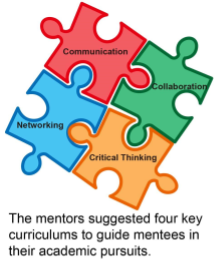Mentoring Matters Perspectives from Basic Science Hematology Investigators (Part 2)

Xu Han, MD, PhD
@PARty4Ever_
Postdoctoral Fellow
Case Western Reserve University
Cleveland, OH

Moua Yang, MD, PhD
@MouaYang21
Instructor
Beth Isreal Deaconess Medical Center
Boston, MA

Our previous article highlighted the importance of a healthy mentor–mentee relationship based on a survey of 25 basic science investigators at different stages of their hematologic careers. Several themes emerged from the study. The mentors wanted to know more about time management, effective communication skills, familiarity with the administrative end of running a lab, competency in mentorship, and management skills. This follow-up article highlights four major curricula that the mentors recommend during your training.
- Improve your communication skills. This includes oral communication skills, such as talking to your lab-mates, mentors, and colleagues, as well as written communication skills, such as preparing manuscripts, reviews, conference abstracts, and fellowship/grant applications. Practice as much as possible. The mentors also offered the following recommendations:
- “Present in journal clubs, student seminars, and group meetings. Every time you present, put in the effort to improve.”
- “If you attend a seminar and the speaker captures your attention, remember what they did. You can incorporate their techniques into your own presentation style”.
- “Write the initial drafts of your own abstracts, papers, fellowship applications, etc., instead of relying on your mentor. Your mentor can then help you edit. You can use the comments to improve in the future. You can also ask someone outside your lab to read drafts to ensure your writing is clear.”
- Collaborate and network as much as you can. “Networking helps to build collaborative relationships both within and outside your institution.” Within the job market, “the interviewers are looking for someone who has collaborated with many people and who has acquired knowledge in multiple areas”. Attending conferences/meetings in your field, like the ASH annual meeting, is key for networking, and you should discuss which meetings you should or would like to attend with your mentor(s).
- Don’t be shy about asking for help and initiating collaborations. Most people working in scientific fields are willing to help when you reach out to them. You will start to grow when seeking expert feedback on your projects — both within and outside your home institution. In addition, try to demonstrate your excitement for projects taken on by your colleagues or collaborators: Step up to ask questions, help out where you can, try to understand all angles of the project, and don’t be afraid to propose solutions and alternative approaches! All this time and effort will make you a better scientist who can assemble a team to tackle any problem.
- Practice critical thinking. “Your ability to do good science is really based on a foundation of critical thinking. The ability to think through your experiments and controls, or to come up with new ideas, really revolves around how much time and thought were put into developing the rationale behind what you were trying to accomplish.”

Based on these results, we recommend that trainees aim to incorporate the following approaches in their career development:
- Improve written communication through scientific writing courses focused on grant writing and research or review articles.
- Improve oral communication practices through courses focused on how to present your scientific work. This could be incorporated into formal research-in-progress seminar series, with built-in review at multiple levels (e.g., principal investigators, peers, students).
- Build your network by attending at least two conferences a year: a major scientific conference in your field to increase your breadth of knowledge in new areas and allow you to meet established investigators and a smaller scientific conference to increase your visibility and ability to network.
- Build strong technical foundations in the following: testing hypotheses and scientific troubleshooting (including the ability to identify key unaddressed questions and knowledge gaps), data interpretation, and statistical analysis.
By successfully incorporating these elements, you will set yourself up to be a competitive scientist with a fulfilling academic career.
Acknowledgement: This article was edited by Drs. Madeline Niederkorn and Andrew Volk. The authors would also like to thank all investigators who participated in our survey and provided thoughtful responses to guide PhD training.
This article is the second of three on the topic of PhD mentorship. Part 3 will focus on do’s and don’ts in the academic track.
Drs. Han and Yang indicated no relevant conflicts of interest.